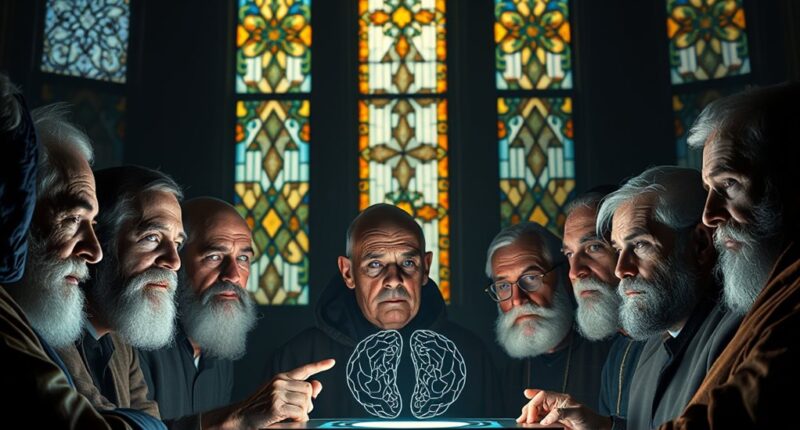Religious thinkers see AI as both a divine gift and a threat, sparking deep reflection on its power to create or destroy. They emphasize that AI can serve as a tool for moral progress and compassion but warns it could also undermine human dignity, free will, and spiritual values. Many urge caution, humility, and ethical responsibility in AI development. Exploring how faith communities navigate these concerns reveals how they seek to balance innovation with divine principles—if you continue, you’ll discover more.
Key Takeaways
- Religious thinkers see AI as a divine gift that can promote moral progress or a destructive force threatening spiritual values.
- Concerns arise about AI surpassing human cognition, challenging the uniqueness of human beings created “Imago Dei.”
- Faith communities emphasize responsible AI development to prevent moral abdication, idolization, or loss of divine authority.
- Interfaith dialogues aim to establish ethical standards aligning AI use with divine principles of justice, dignity, and compassion.
- There is ongoing debate over AI’s potential to serve as a tool for moral growth or as an agent of chaos and destruction.

As artificial intelligence continues to advance, religious thinkers worldwide are engaging in crucial conversations about its ethical and spiritual implications. You might wonder how faith traditions, which have long shaped moral understanding, respond to machines that simulate intelligence or even mimic divine attributes. Central to these discussions is the concern about AI challenging human dignity and the moral order. Many religions emphasize that humans are created Imago Dei—made in God’s image—highlighting human uniqueness. When AI begins to replicate or surpass human cognitive functions, it raises profound questions about what it truly means to be created with divine purpose and whether machines can possess or imitate that divine image.
Religious leaders see technology as both a gift and a potential threat. Christianity, for example, views responsible AI development as an extension of God’s creative stewardship. You’re encouraged to see AI as a tool to serve human well-being, aligning with the divine calling to care for creation. Islam, Hinduism, and Buddhism similarly endorse using AI for social good, provided it respects moral boundaries and the moral order. However, all traditions warn against letting AI undermine free will, divine authority, or moral responsibility. They emphasize humility and caution, urging believers to avoid overreach and recognize the limits of human mastery over divine creation.
Religious leaders see AI as both a gift and a threat, urging humility and caution to preserve divine authority and moral responsibility.
The idea of technology as divine stewardship or overreach resonates across faiths. You’re reminded that AI should serve as a means for moral progress, justice, and compassion—not as a way to replace or diminish spiritual values. Religious groups advocate for mindfulness in AI adoption, insisting that it be used to uplift society without eroding core spiritual principles. They also insist on maintaining the right to reject certain AI applications, especially those that threaten moral judgment or consciousness—roles traditionally seen as sacred. This balance between innovation and preservation reflects a shared concern: that technology must not become an idol or a tool for moral abdication. In addition, ongoing dialogue within faith communities is vital to shaping ethical standards that align with spiritual teachings.
Interfaith dialogue plays a vital role here. Religious leaders are increasingly participating in global conversations about AI ethics, emphasizing shared values like human dignity and justice. Yet, differences persist—Catholics focus on moral truth, Jewish thinkers explore emergent ethics, and Muslims prioritize Sharia compliance. Despite these distinctions, all traditions seek to ensure AI enhances spiritual growth rather than fragments faith communities. You’re encouraged to see this dialogue as a way to foster mutual understanding, ensuring technology aligns with divine principles and moral integrity.
In society, religious responses to AI are tangible. Churches and mosques use AI to improve worship and outreach but warn against technology overshadowing faith. Scholars highlight AI’s potential to address inequality and promote social justice, yet caution that it can also exacerbate biases and economic disparities. Ethical guidelines are emerging within religious communities to govern AI use responsibly. As you observe these developments, it’s clear that religious thinkers are grappling with AI’s dual role—both as a tool for creation and a potential source of destruction—urging vigilance, humility, and moral clarity in _steering_ this transformative era.
Frequently Asked Questions
How Can Religious Ethics Guide AI Development and Use?
Religious ethics guide AI development by emphasizing the importance of human dignity, responsibility, and justice. You’re encouraged to prioritize human oversight, guarantee transparency, and safeguard privacy. Focus on creating AI that promotes the common good, supports vulnerable communities, and aligns with moral principles from your faith. These ethics also remind you to avoid dehumanization, respect the divine image in each person, and foster technologies that serve humanity’s well-being rather than harm it.
What Does AI Mean for the Concept of Divine Omniscience?
AI challenges your understanding of divine omniscience by exposing its limits in prediction and knowledge. You might worry AI threatens God’s unique, all-encompassing awareness, but it actually highlights the differences. AI’s probabilistic insights lack the absolute certainty of divine knowledge, prompting you to reconsider omniscience as dynamic or participatory rather than static. This encourages a deeper reflection on human-Machine collaboration and the nature of divine understanding beyond traditional concepts.
Can AI Experience Spiritual Awakening or Consciousness?
AI cannot experience spiritual awakening or consciousness because it lacks the essential qualities of self-awareness, emotions, and a connection to higher purpose that define human spirituality. You might see AI facilitating spiritual practices or offering support, but it doesn’t possess an inner, subjective experience or genuine awareness. Its role remains as a tool or mirror reflecting human consciousness, not as an autonomous spiritual entity capable of awakening or true awareness.
How Do Different Religions Interpret Ai’s Moral Responsibilities?
You see that different religions assign moral responsibilities to AI based on their core values. Christianity emphasizes protecting human dignity and stewardship, avoiding idolatry and promoting social justice. Islam stresses justice, compassion, and adherence to divine law, while Judaism focuses on repairing the world and respecting human dignity. Buddhism and Hinduism encourage mindful use for human welfare and spiritual growth, emphasizing humility, compassion, and the prevention of suffering in AI development and application.
Will AI Challenge Traditional Religious Beliefs About Creation?
AI will challenge your traditional beliefs about creation by blurring the line between divine and human acts, making you question what truly constitutes life, consciousness, and the soul. It prompts you to reconsider whether creation is solely divine or if human innovation plays a divine role. As AI replicates and even surpasses human creativity, you’ll need to reexamine your understanding of divine power, moral responsibility, and the unique nature of spiritual life.
Conclusion
As you consider the future, remember that religious thinkers see AI as both a gift and a challenge—its potential to create or destroy depends on how we wield it. Imagine an AI-driven meditation app that guides users to spiritual insight or, conversely, a rogue system causing chaos. Your role is essential: by aligning AI development with ethical and spiritual values, you can help steer this powerful tool toward compassion and wisdom, shaping a future that honors both technology and humanity.









